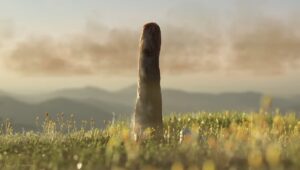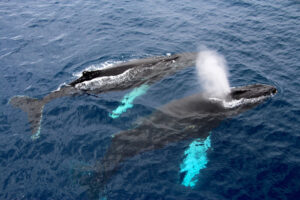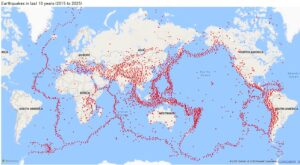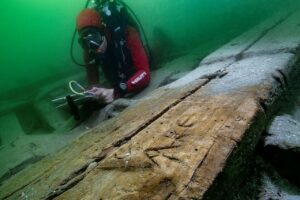Davey and Robyn Wolff to pedal across the Atlantic Ocean.
(Correne Coetzer) Three years ago, Robyn Wolff got a phone call that her son, Davey du Plessis, had been shot on the Amazon River. He had bullets in his spine, face, neck, skull, arms, was left for dead, got up, ran for about 5 km to get help, saw people, tried to call for help but no sound came out because he had been shot in the neck, reported Explorersweb back then.
Davey got shot by people in the Jungle, while canoeing down the Amazon. He thought it was over but, chose to live.
Fast forward three years, at the end of this month (weather window permitting), the 27-year-old South African is off on his next expedition, crossing the Atlantic Ocean from Hout Bay, Cape Town, South Africa to Rio de Janeiro in Brazil, in a pedal boat. The distance of 6500 km will take an estimated 3 – 6 months, he told Pythom.
This time Davey won’t be alone, his mother, Robyn, will be joining him. Pythom caught up with him and Robyn. Today, Davey tells why he decided on a pedal boat, their routine, their Raw Vegan menu, addressing the greatest environmental disaster, and more.
PYTHOM: Why a pedal boat and not a row boat?
DAVEY: I chose a pedal boat based on the expected efficiency. A pedal boat allows you to be encapsulated and sheltered from the elements, unlike a rowboat. A pedal boat also allows for better propulsion. Rowboats only gain forward movement when the oar blades are pulled, then lose drive when the rower lifts the blades and winds up for another row stroke, whereas a pedal boat is powered in a propeller that sits in the water constantly. In theory a pedal boat seemed like the most efficient way to cross an ocean under human power.
PYTHOM: Can you both pedal at the same time?
DAVEY: No, crossing an ocean is about consistency, as soon as you stop pedaling you are either losing ground or being pushed off course, so the idea is to rotate in 4 hour shifts day in and day out for the entire journey.
PYTHOM: Where are your sleeping quarters?
DAVEY: Sleeping quarters are in the aft section of the boat, the backwards 2.5 metres of the boat is a sleeping cabin. The middle section is the cockpit and the front 2 metre section is storage.
PYTHOM: How will you be sitting when paddling?
DAVEY: The sitting positing is similar to a recumbent, almost like sitting on a deck chair with your legs in front of you pedaling.
PYTHOM: How will you keep your body in shape in limited space like that, and in particular more than your legs?
DAVEY: By default we have found that the boat can also be powered by pedaling with your arms, so if or when the legs get tired you can lean forward and pedal with your arms. Other than that, there is very little room to do any other physical exercises.
PYTHOM: You both are Vegan (or Raw Vegan?)…
DAVEY: I am a raw vegan, so no animal products or by-products in any sphere of my life and no cooking of my food at all. I have been vegan for 7 years and raw for the passed 2 years. I take no supplements, vitamins or medicines, nor do I suffer from any health issues. I have seen the food most adventurers eat and it is terribly unhealthy, often suffering from sickness, infections and fatigue. They live off high calorie and highly processed foods, it’s no wonder the average adventure seems to suffer from physical and health issues. My diet is clean, simple and effective.
PYTHOM: What is on your menu?
DAVEY: Whole coconuts, raw nuts, seeds for sprouting, fresh fruit for the beginning, dehydrated fruits and vegetables.
PYTHOM: Anything else?
DAVEY: The Atlantic Project is not just a pedal across an ocean; it’s dedicated to addressing the greatest environmental disaster, which is the mass extinction of species caused solely by humans. We are living in a time where we are seeing the extinction of species so great that it rivals the extinction of the dinosaurs, but unlike the dinosaurs being wiped out by a meteor, humans have now taken the reigns and driving extinction through our industrial development, agriculture, over population, consumption, hunting and destruction of natural ecosystems. It’s a sobering reality of human neglect, exploitation and destruction of the natural world. Visit www.extinctionsix.com for more information.
BACKGROUND 2012 Amazon project:
Davey du Plessis attempted a crossing of the South American continent from the Atlantic coastline of Peru to the Pacific coastline of Brazil, following the Amazon River.
2015-16 PEDAL BOAT:
The boat was designed by USA based naval architect Dudley Dix and was built in Knysna (South Africa) by boat builder, Tertius du Plessis. “From design to build has been an almost 2 years process. The boat is a one of a kind design, built to endure heavy seas and self-right itself if capsized. We move so slowly that the boat had to be centered on going through storms and not around them.”
The boat has been named ‘Vaquita’, after a critically endangered porpoise in the Gulf of Mexico. It is the most endangered cetacean species, with fewer than 94 remaining, explains Davey.
Davey’s book, available at bookstores or on the Internet:
“Choosing To Live: A remarkable true story of adventure and survival in the Amazon Jungle”
#oceans #atlantic #daveyduplessis #robynwolff #pedaltheocean #pedaltheatlantic
Website www.daveyduplessis.com
Live tracking at www.daveyduplessis.com/track-me (click link below)
NEXT in link below: Pythom Interview with Robyn Wolff






